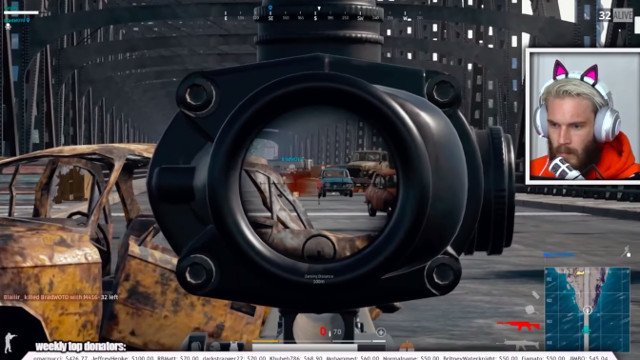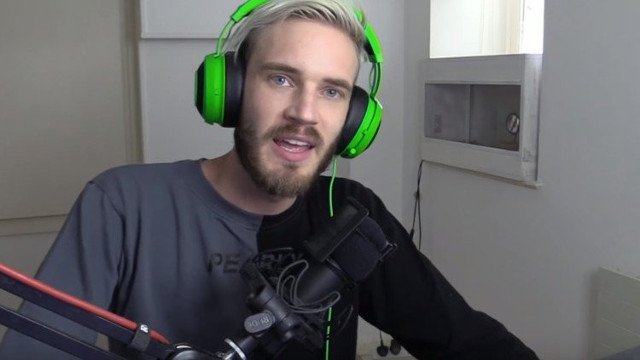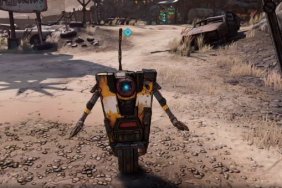Earlier this week, YouTube star Felix “PewDiePie” Kjellberg angrily blurted out the n-word during a live stream to his fans and subscribers. While playing the popular PC game PlayerUnknown’s Battlegrounds, the 27-year-old shouted: “What a f***ing n****r! Oh my god, what the f***? Sorry, but what the f***?” After realizing he’d let the word slip, he added: “I don’t mean that in a bad way, but Jesus Christ.”
This is the latest in a series of hugely divisive actions made by the content creator, who at the time of this writing has 57 million subscribers and is YouTube’s most popular video maker by a considerable margin. Earlier this year, he posted a video in which he paid two people on the online freelancer marketplace Fiverr to hold up a sign reading “Death to all Jews.” This prompted the Wall Street Journal to write an article criticizing his actions, which in turn caused the Disney production company Maker Studios to sever ties with him and prompted YouTube’s cancellation of his reality show, Scare PewDiePie.
While PewDiePie later acknowledged that he had gone too far with his anti-Semitic jokes in a half-hearted apology video, he continued to suggest that his accountability should have only stretched so far. The media went over-the-top, he insisted, and the YouTube community hopped aboard this bandwagon, eager to enforce an “us vs. them” narrative between new and old media, suggesting that publications had smelt blood in the YouTube waters and were encircling its most famous personality out of little more than jealousy, or a general disdain for the success of the video-sharing site and its users.
The YouTube community circled its wagons following the initial PewDiePie controversy, framing criticisms levelled at the creator as part of a wider conspiracy to bring the site to its knees. Even those within the community who spoke out against him were branded traitors, with his close friend and fellow video maker Jacksepticeye initially calling PewDiePie’s actions “very moronic” in a video discussing the controversy before back-tracking considerably, later commenting that he had focused “too much on what Felix did and whether I agreed with it or not instead of elaborating on the media side of it all” (via Kotaku).
Which brings us to this week. Whereas PewDiePie’s previous controversies had some degree of ambiguity, with his defenders able to make the claim that his comments had either been taken out of context or had been made as part of an ill-advised joke, there is no available context that makes him angrily using the n-word any better. In fact, this time around the context makes it slightly worse; after saying “what a f***ing n****r,” he then corrected himself by saying “what a f***ing a**hole.”
Also: PewDiePie Responds to N-Word Controversy: “I’m Just an Idiot”
With the previous defense used for PewDiePie’s actions now stripped away, the sycophants among YouTube’s community have been left scrabbling for other excuses. One such excuse, initially spouted by The Daily Caller writer Ian Miles Cheong, is that his angry use of the n-word was simply a “heated gaming moment.” Similar defenses have now been spouted by the likes of Keemstar, another highly popular video maker, who posted a video detailing his thoughts on Twitter: “For those of you that are gamers, when you are playing the game, and you get in the heat of the moment, you say the most awful shit you can think of at the time, at the person,” the ‘DramaAlert’ creator said, adding: “I know this because I’ve seen so many f***ing gamers do it, and I myself have done it many times.”

While this desperate scramble to defend PewDiePie is not emblematic of the whole of YouTube, with a few prominent video makers having condemned his use of the racial slur, throughout the course of the year his peers have remained so unwavering in their inability to admit fault in his actions that it has developed into tacit approval. The unwillingness on behalf of YouTubers to hold PewDiePie accountable saw him effectively becoming untouchable within its community, leading to his videos featuring an increasingly controversial political slant that suggested he was leaning into his new, far-right following; InfoWars’ editors began praising him for “red pilling” his audience, while he posted a video in which he defended the politician Janusz Korwin-Mikke in an interview discussing the Polish MEP’s belief that women are less intelligent than men.
Each time reports would surface describing PewDiePie’s behavior, both his supporters and the figureheads of the YouTube community would rally behind him, ignoring his actions in favor of condemning the reaction to them. Unfortunately for them this isn’t possible this time around, as there is no ambiguity in what has caused this latest controversy: he blurted out the n-word in a moment of frustration, “hard r” and everything, and there is no other context than that.
There were arguments that were made against each of the reports that surfaced against PewDiePie since the initial controversy last February. Wall Street Journal took images of the YouTuber doing the Nazi salute out of context, it was argued, and his defense of Janusz Korwin-Mikke may have been done without knowledge of the politician’s history of sexist and xenophobic comments. When he uploaded footage of him drawing Pepe the Frog, a formerly innocuous web comic character that has since become known as a symbol used by white nationalists, his defenders retaliated that it was “just a meme” and not necessarily indicative of his political stance.
However, whereas each of those arguments had varying degrees of plausibility, both PewDiePie and those in the YouTube community who once refused to leave his corner are now left with little wiggle room to argue his case. As a result many have instead opted to turn their attention to Campo Santo, the development studio behind Firewatch, who have announced that they’re filing DMCA takedowns of PewDiePie’s videos featuring their game in response to his outburst. Discussing this latest controversy, the game’s writer Sean Vanaman tweeted: “I am sick of this child getting more and more chances to make money off of what we make. He’s worse than a closeted racist: he’s a propagator of despicable garbage that does real damage to the culture around this industry.”

With DMCA claims and copyright strikes being a contentious subject within the YouTube community, some YouTubers are attempting to replace Campo Santo’s decision to issue a DMCA claim with PewDiePie’s n-word outburst as the real controversy, once again positioning him as the victim and glossing over his actions leading up to this point. As outlined by “video game attorney” Ryan Morrison, Campo Santo are within their legal rights to file the DMCA claim after revoking its license due to his outburst, and it’s unquestionable that the claim is not as problematic as PewDiePie using a racial slur in front of his millions of viewers. So why is it being treated as such?
There is valid copyright infringement taking place after they revoked a license due to his actions. Nothing illegal about that. https://t.co/V9NHqTa1nn
— Video Game Attorney (@MrRyanMorrison) September 11, 2017
The answer to this is that, more than anything else, YouTubers hate being held accountable for their actions. In an excellent Twitter thread, Cool Ghosts and Shut Up Sit Down creator Matt Lees described what it’s like to be a YouTuber who actively fights for inclusiveness on the site: “It’s easy to build a community that is nice and friendly – just act fuzzy & ensure you never take a clear stance on anything. Very YouTube,” he said. “But being actually thoughtful & inclusive requires that you get your hands dirty – and because so few do it, this usually makes you a target.”
He continued: “”The temptation of course is just not to do it – to purposefully avoid ever mentioning issues and just have fun. Which is why YT is as it is. But it’s toxic that a total lack of values is so endemic in the YT/gaming space that simply having any makes your life very difficult. In YT games community I went from rising star to outcast, primarily because I stood against other creators: the only sin of that world. In 2017 it’s crystal-clear: the only behaviour that the YT/games community simply won’t tolerate are public calls for accountability.”
Now the lack of values on YouTube, along with the admonishment received by those standing up for accountability on the site, has led to the de facto face of the company blurting out the n-word on a live stream, and many among the site’s community once again rushing to argue that everyone should give him the benefit of the doubt for the umpteenth time this year. But how many times can one person keep making these “mistakes” until they can no longer be perceived as mistakes? And how many times will such controversies arise before the YouTube community places itself under the same amount of scrutiny it currently only reserves for those who criticize it?







